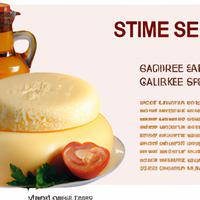
1 serving (28 grams) contains 110 calories, 7.0 grams of protein, 9.0 grams of fat, and 1.0 grams of carbohydrates.

Log this food in SnapCalorie

Nutrition Information
Calories |
932.2 | ||
|---|---|---|---|
% Daily Value* |
|||
| Total Fat | 76.3 g | 97% | |
| Saturated Fat | 50.8 g | 254% | |
| Polyunsaturated Fat | 0 g | ||
| Cholesterol | 211.9 mg | 70% | |
| Sodium | 1525.4 mg | 66% | |
| Total Carbohydrates | 8.5 g | 3% | |
| Dietary Fiber | 0 g | 0% | |
| Sugars | 0 g | ||
| protein | 59.3 g | 118% | |
| Vitamin D | 50.8 mcg | 254% | |
| Calcium | 1694.9 mg | 130% | |
| Iron | 0.8 mg | 4% | |
| Potassium | 169.5 mg | 3% | |
* Percent Daily Values are based on a 2,000 calorie diet. Your daily values may be higher or lower depending on your calorie needs.
Food Attributes
Source of Calories
About Strong cheese
Strong cheese, known for its robust flavor and aroma, is a category that includes varieties such as Roquefort, Gorgonzola, and aged cheddar. Typically crafted from cow, sheep, or goat milk, it gains its distinct intensity through aging or the introduction of molds like Penicillium. Rich in calcium and protein, strong cheese supports bone health and muscle repair. It also offers vitamins such as B12 and A, essential for energy and immune function. However, it can be high in saturated fats and sodium, which may impact heart health if consumed excessively. Originating from regions like France and Italy, strong cheese is a staple in European cuisine, often used to enhance dishes like pasta, salads, or artisanal sandwiches. This nutrient-dense food delivers bold flavor but should be enjoyed in moderation for a balanced diet.



